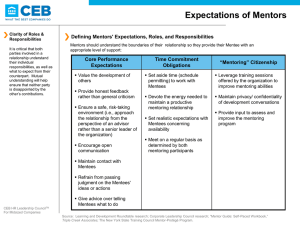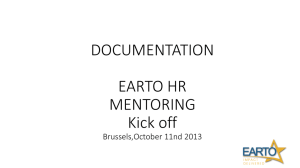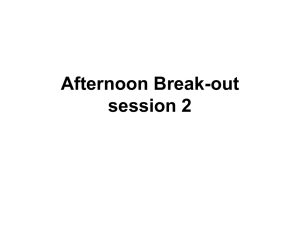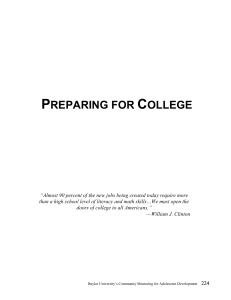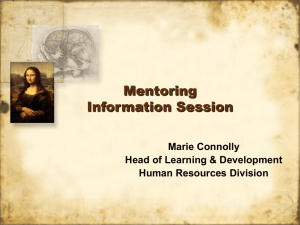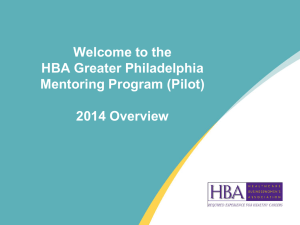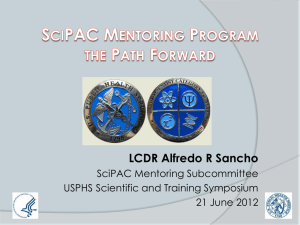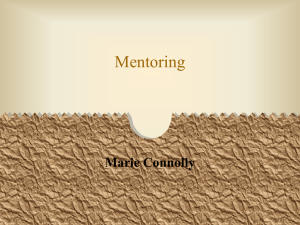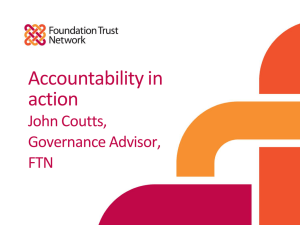AAMC GFA Poster #1 - Johns Hopkins Medicine
advertisement
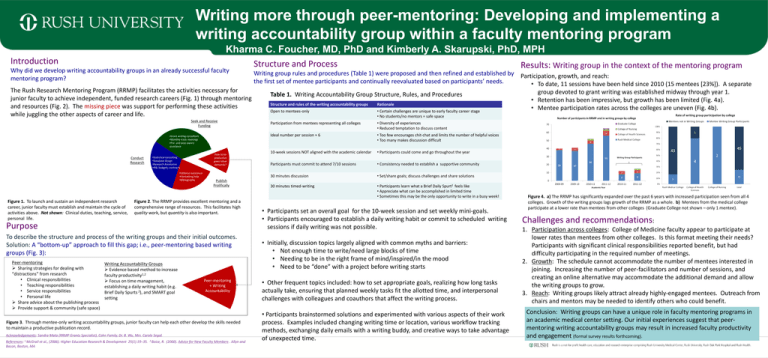
Writing more through peer-mentoring: Developing and implementing a writing accountability group within a faculty mentoring program Kharma C. Foucher, MD, PhD and Kimberly A. Skarupski, PhD, MPH Structure and Process Results: Writing group in the context of the mentoring program Introduction Why did we develop writing accountability groups in an already successful faculty mentoring program? The Rush Research Mentoring Program (RRMP) facilitates the activities necessary for junior faculty to achieve independent, funded research careers (Fig. 1) through mentoring and resources (Fig. 2). The missing piece was support for performing these activities while juggling the other aspects of career and life. Seek and Receive Funding •Grant writing consultant •Monthly track meetings •Pre- and post-award assistance Conduct Research •Statistical consulting •Database design •Research Assistance •IRB, budgets, contracts • Figure 1. To launch and sustain an independent research career, junior faculty must establish and maintain the cycle of activities above. Not shown: Clinical duties, teaching, service, personal life. •Editorial assistance •Formatting help •Bibliography How to be productive given other demands? Publish Prolifically Figure 2. The RRMP provides excellent mentoring and a comprehensive range of resources. This facilitates high quality work, but quantity is also important. Purpose To describe the structure and process of the writing groups and their initial outcomes. Solution: A “bottom-up” approach to fill this gap; i.e., peer-mentoring based writing groups (Fig. 3): Peer-mentoring Sharing strategies for dealing with “distractions” from research • Clinical responsibilities • Teaching responsibilities • Service responsibilities • Personal life Share advice about the publishing process Provide support & community (safe space) Writing Accountability Groups Evidence based method to increase faculty productivity1,2 Focus on time management, establishing a daily writing habit (e.g. Brief Daily Spurts 2), and SMART goal setting Peer-mentoring + Writing Accountability Figure 3. Through mentee-only writing accountability groups, junior faculty can help each other develop the skills needed to maintain a productive publication record. Acknowledgements: Sandra Mata (RRMP Grants Specialist), Cohn Family, Dr. B. Wu, Mrs. Carole Segal. References: 1.McGrail et al., (2006). Higher Education Research & Development 25(1):19–35. 2.Boice, R. (2000). Advice for New Faculty Members . Allyn and Bacon, Boston, MA Writing group rules and procedures (Table 1) were proposed and then refined and established by the first set of mentee participants and continually reevaluated based on participants’ needs. Table 1. Writing Accountability Group Structure, Rules, and Procedures Structure and rules of the writing accountability groups Rationale Open to mentees-only • Certain challenges are unique to early faculty career stage • No students/no mentors = safe space Participation from mentees representing all colleges • Diversity of experiences • Reduced temptation to discuss content Ideal number per session ≈ 6 • Too few encourages chit-chat and limits the number of helpful voices • Too many makes discussion difficult 10-week sessions NOT aligned with the academic calendar • Participants could come and go throughout the year Participants must commit to attend 7/10 sessions • Consistency needed to establish a supportive community 30 minutes discussion • Set/share goals; discuss challenges and share solutions 30 minutes timed-writing • Participants learn what a Brief Daily Spurt2 feels like • Appreciate what can be accomplished in limited time • Sometimes this may be the only opportunity to write in a busy week! • Participants set an overall goal for the 10-week session and set weekly mini-goals. • Participants encouraged to establish a daily writing habit or commit to scheduled writing sessions if daily writing was not possible. • Initially, discussion topics largely aligned with common myths and barriers: • Not enough time to write/need large blocks of time • Needing to be in the right frame of mind/inspired/in the mood • Need to be “done” with a project before writing starts • Other frequent topics included: how to set appropriate goals, realizing how long tasks actually take, ensuring that planned weekly tasks fit the allotted time, and interpersonal challenges with colleagues and coauthors that affect the writing process. • Participants brainstormed solutions and experimented with various aspects of their work process. Examples included changing writing time or location, various workflow tracking methods, exchanging daily emails with a writing buddy, and creative ways to take advantage of unexpected time. Participation, growth, and reach: • To date, 11 sessions have been held since 2010 (15 mentees [23%]). A separate group devoted to grant writing was established midway through year 1. • Retention has been impressive, but growth has been limited (Fig. 4a). • Mentee participation rates across the colleges are uneven (Fig. 4b). Figure 4. a) The RRMP has significantly expanded over the past 6 years with increased participation seen from all 4 colleges. Growth of the writing groups lags growth of the RRMP as a whole. b) Mentees from the medical college participate at a lower rate than mentees from other colleges (Graduate College not shown – only 1 mentee). Challenges and recommendations: 1. Participation across colleges: College of Medicine faculty appear to participate at lower rates than mentees from other colleges. Is this format meeting their needs? Participants with significant clinical responsibilities reported benefit, but had difficulty participating in the required number of meetings. 2. Growth: The schedule cannot accommodate the number of mentees interested in joining. Increasing the number of peer-facilitators and number of sessions, and creating an online alternative may accommodate the additional demand and allow the writing groups to grow. 3. Reach: Writing groups likely attract already highly-engaged mentees. Outreach from chairs and mentors may be needed to identify others who could benefit. Conclusion: Writing groups can have a unique role in faculty mentoring programs in an academic medical center setting. Our initial experiences suggest that peermentoring writing accountability groups may result in increased faculty productivity and engagement (formal survey results forthcoming).
